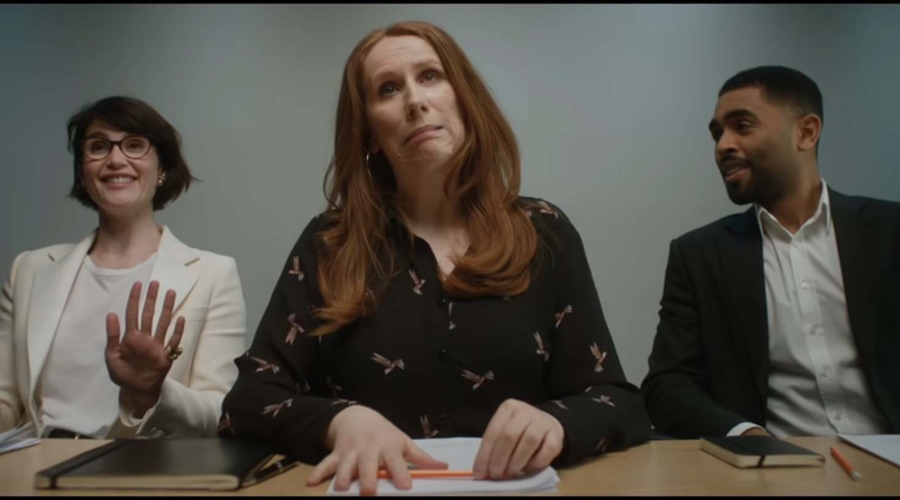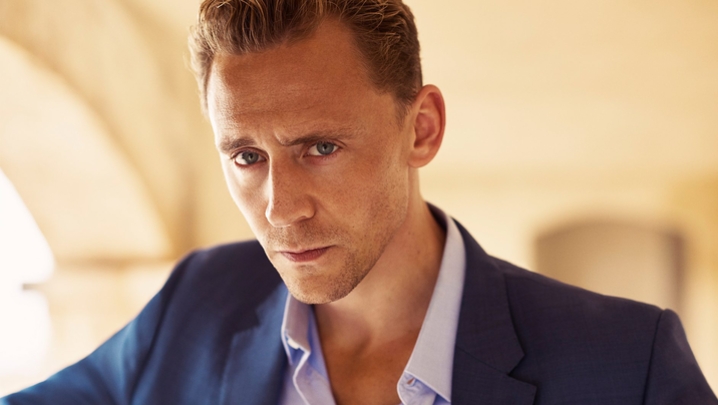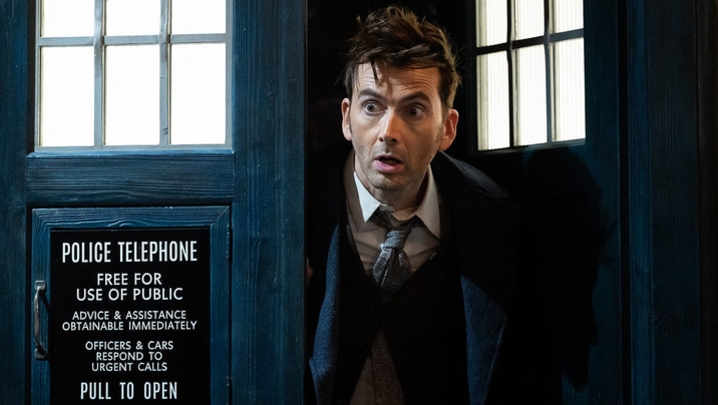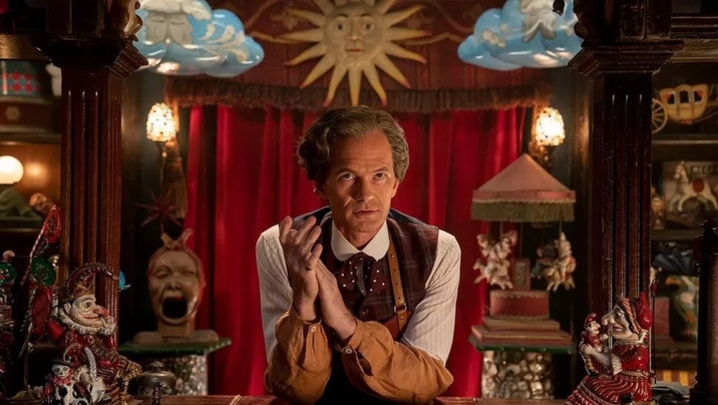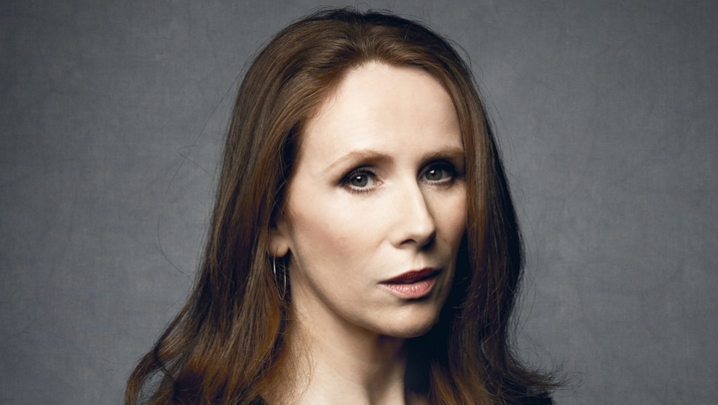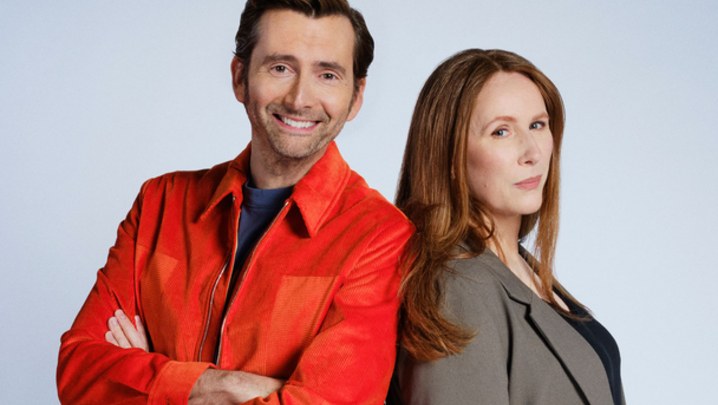Among many toe-curling moments in the BBC’s recent comedy short Leading Lady Parts, one stands out.
Wunmi Mosaku, best known for her work in the award-winning The End of the F***ing World, comes in to audition for a role, but is turned away for being black.
“Look, it’s not that kind of film darling”, the panel says as she enters the audition suite. “They’re auditioning for that other film… Black Panther Returns… That’s in the next suite.”
“It was so awkward and so painful,” recalls writer and director Jessica Swale. “It does make you feel dirty setting that scene up, knowing that it is not that far away from what [Mosaku may] have faced in real life.”
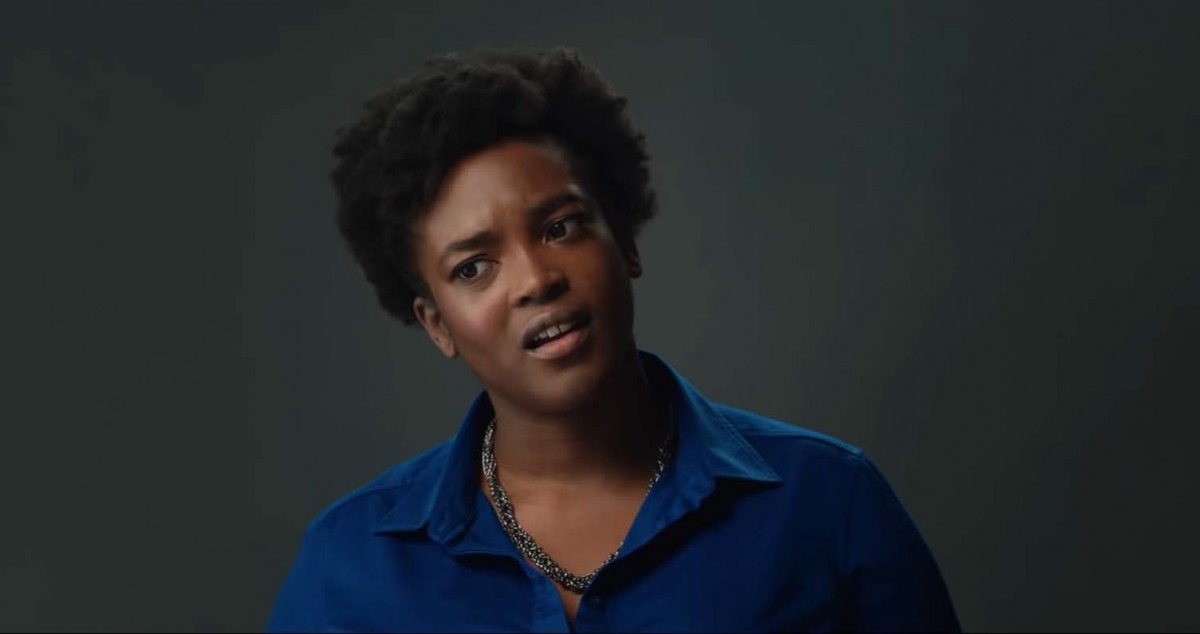
(Credit: BBC/Rebel Park)
The point of the short – which despite its weighty subject matter, is very funny – is to illuminate what is happening behind closed doors.
Jessica Malik – one of the executive producers – recalls how Mosaku’s reaction when the script was first sent to her. “She said, ‘I’d love to be involved in this, but the truth is I wouldn’t get seen for this role. I get seen for the leading lady role when it’s a black story.”
Mosaku’s treatment is just one way in which the film explores the treatment of women in these scenarios.
The short film sees a series of famous faces, from Felicity Jones and Emilia Clarke, to Lena Headley and Gemma Chan, audition for an unnamed Leading Lady Part. The women are all knocked back with a series of impossibly unreasonable demands.
“Unfortunately,” reflects Swale, “all of them are based on truth of some kind.”
Emilia Clarke was told to be more ‘smiley’, Stacey Martin to wear more makeup, Felicity Jones: fewer clothes, and Gemma Chan was asked to be “a bit more white”.
“When we all got together to make the film, the sharing of stories in the greenroom was quite extraordinary,” Swale recalls. “Everybody said, ‘Oh I was asked to lose weight overnight’ or ‘I was told I was too white or too black.’ Everybody has a story like that.”
Report after report highlight an entrenched inequality in TV and the media. Directors UK recently revealed the gender gap among directors of shows on the channels of the main four British broadcasters, which has increased in the three years to 2016, meaning that only 25% of TV episodes were directed by women in the period.
Malik recalls a statistic indicating that despite courses at organisations like the NFTS and London Film School beginning courses with a nearly 50-50 gender divide, within three years of starting work, as many as 80% of women have decided to leave the industry.
A similar story is seen onscreen. According to figures from the BFI, the number of female actors onscreen has declined markedly in the last 100 years. In 1917 over 40% of those onscreen were women, by 2017 the figure had dropped to just 32%.
Check out @wunmo’s behind the scenes interview about what #LeadingLadyParts means to her as a woman of colour. “There are so many stories that aren’t race specific that we watch all the time, it’s about including people.” Tune in tonight at 10pm on @BBCFour pic.twitter.com/soogNVlLqy
— Rebel Park Productions (@rebelparkprod) July 30, 2018
Report after report highlight an entrenched inequality in TV and the media. Directors UK recently revealed the gender gap among directors of shows on the channels of the main four British broadcasters, which has increased in the three years to 2016, meaning that only 25% of TV episodes were directed by women in the period.
Malik recalls a statistic indicating that despite courses at organisations like the NFTS and London Film School beginning courses with a nearly 50-50 gender divide, within three years of starting work, as many as 80% of women have decided to leave the industry.
A similar story is seen onscreen. According to figures from the BFI, the number of female actors onscreen has declined markedly in the last 100 years. In 1917 over 40% of those onscreen were women, by 2017 the figure had dropped to just 32%.
Leading Lady Parts – the title of which came from writer Jessica Swale’s “slightly rude imagination” – arose out of a Times Up meeting at the start of the year. Gemma Arterton, who appeared in and executive produced the film, was speaking to another actress about how they could use their platform as actors to say something about #MeToo, rather than as spokespeople.

(Credit: BBC/Rebel Park)
Swale had reached the same conclusion and overnight produced a script for the short.
“Literally the next day, we were sent it,” recalls executive producer Jessica Malik. “It was so funny. Because it’s so absurd – and that’s actually the reality of a lot of situations – it’s actually a brilliant way to make the point.”
Malik’s background is in the business side of film-making, and so she is more familiar than most about what can be said about actors behind closed doors. “It was – I hope I can say that in the past [tense] - very very common for these comments to be said about actors. It saps every form of creativity out of you to hear these comments.”
The point of the film, the pair agree, was to make a number of key points in a brief and funny way.
It was a sentiment shared by the entire cast and crew who volunteered their time for the shoot.
“So many people said this stuff had happened [to them],” recalled Swale. One of the actors in the film was so keen to be involved she managed to squeeze in a full day filming, despite only being in the country for 24 hours before she needed to fly off for a magazine cover shoot.
However the film’s target of a 100% female crew proved impossible. “It just didn’t work,” Swale laments. “I think there’s one female grip registered in the entire country. It made me realise how rare women are in a lot of those fields.”
For Swale, who is currently in pre-production for her first feature film Summerland, this is an enduring frustration. “This film should be a real opportunity for lots of people who might not necessarily get a chance otherwise.” However she has found it very difficult to build a crew comprising a large number of women and people of colour. “People are willing to do this,” she believes, “but the tricky thing is finding people.”
“There’s a great deal of goodwill but if it takes you an extra week to try and find people [it’s unlikely to happen.]” A solution, she says, could be an industry-wide list of female and BAME crew. She also supports quotas on films. Every person who has rejected the idea of quotas has, in her experience, been “a privileged white man in an office”. Those who would benefit from their introduction has said they’d be happy to take that job. “That’s how people get experience,” she believes. “We have to start somewhere!”
For Malik, education is the key. As part of the promotion are Leading Lady Parts they interviewed all the cast and crew about their roles and their experiences which, she hopes, will make people away of the lesser-known vocational roles in the media.
However despite the weighty subject matter, the laughs are the essential ingredient of the film.
Watch @Gemma_Chan1 discuss her role in #LeadingLadyParts and the importance of self-confidence! Her advice? "Don't let people treat you in a way that devalues you." Tune in tonight at 10pm on @BBCFour pic.twitter.com/vSdVpGUEU3
— Rebel Park Productions (@rebelparkprod) July 30, 2018
“Feminism for a long time had a bad reputation because people assumed that feminists were angry women and therefore didn’t listen to them,” Swale believes. “And actually, we absolutely are that, but we’re also multifaceted women with different voices and we have a great deal to say and lots of different ways of saying it. And we all have a sense of humour.”
It's that attitude which leads to lines like, “It’s not rocket science darling. We’re just asking you to be thin and curvy, sexy and innocent.” It’s a satire that’s all too recognisable. “I have always felt that messages which are shaped in a comic form are much more palatable,” Swale says. “One good thing about comedy is that you can hopefully get your message to people that wouldn’t choose to engage otherwise with that material.”
And the message is being heard. Over 11 million people have watched the short film, Swale reports, and the internet is awash with people expressing their support of the film. There have been criticisms that the short film neglects a number of oft-discriminated against groups including lesbians, and disabled women. It’s a fair response, says Swale, but in a short comedy film it just isn’t possible to address all people. “There are so many ways in which discrimination is rife in casting, [however] it wouldn’t be funny if [the film] was half-an-hour long…!”
Who inspires our cast and crew? @twhiddleston chose director Joanna Hogg. “We need more Joanna Hoggs in this world,” Tom says. #WhoIsYourLeadingLady? #LeadingLadyParts pic.twitter.com/w9ZLK3N8S3
— Rebel Park Productions (@rebelparkprod) August 1, 2018
Overall the reception has been extremely positive. “What I really enjoyed from the reading that I have done on Twitter and that sort of thing, is the support of not only people from lots of different backgrounds, but lots of men too,” she adds. “This is something we need to address as a whole.”
The blame does not lie entirely on the shoulders of men. “There’s been a lot of complicity,” she says. She recalls instances in Hollywood studios where she has been pushed into making a female character “attractive to an audience according to what stereotypes men conventionally want”.
To blame one group of people for the situation encourages the mistaken belief, she says, that when the current generation of executives retire, the problem will go away. “It’s very easy for those notions of how to operate to be passed on to younger generations.”
But it can change, she says, and it is changing. “When individuals take responsibility for trying to make these changes happen, they happen. All it takes is energy.”
Leading Lady Parts is the first in a series of short films about the Times Up movement, designed to raise awareness and promote debate.

